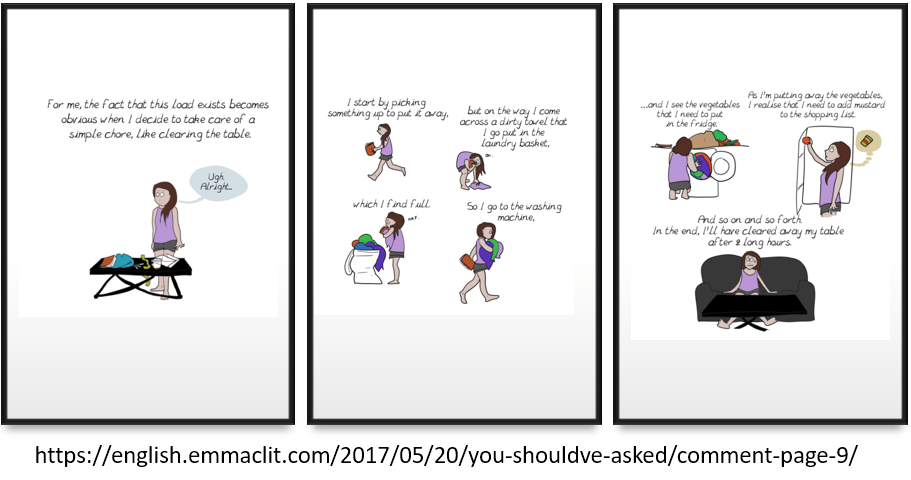Warning: this is a long post. If you’re pressed for time, scroll to the bottom and join our FB community to access Ditching The Mental Load Playbook to start enjoying motherhood without all the drama, mental fatigue and mom guilt.
I have a bold claim about motherhood as the central message of my blog site, and I display it clearly on my home page. It’s go big or go home for me. The vision and purpose for what I do and how I intend to help moms and mompreneurs everywhere is this:
“Reinventing what it means to do it all, have it all, and enjoy it all_ while having fun along the way.”
Can we reinvent motherhood through play?
My answer is an energetic YES.
“Well, what does that look like?” you ask.
Let me answer with a question:
How fantastic it would be if you were able to transform the complex, focused work (of motherhood) into something that felt like play?[1]
First, let’s take a step back and define play to avoid confusion. Most people think of play as doing what you want, without any expectations or duty attached. Play seems like a thoughtless activity that is superficial and done for the mere sake of entertainment and maybe passing the time.
But as Ian Bogost challenges in his book Play Anything, fun doesn’t have to feel good. ‘Fun,’ he writes, ‘turns out to be fun even if it doesn’t involve much (or any) enjoyment.’ Huh?[2]
Well, according to Bogost, ‘Play is a way of operating a constrained system in a gratifying way.’
And doesn’t motherhood sometimes feel like a constrained system? Wishing we could do whatever we wanted as mothers but constantly working within constraints and limitations at all times?
Starting with those early motherhood days, we find ourselves operating from a much more limited context because our children are now in the picture. If our child is nursing, there’s not much else that we can do. I remember checking my infant’s temperature every hour of the day or night when she had a fever. Not exactly how I would have liked to be spending my time.
Was that fun?
Well, if we use the definition of fun as the experience of pleasure, then no.
But if we take it as the outcome of tinkering with a small part of the world in a surprising way, then yes, it was. I was learning how to be a mom.
Let’s be honest. When it comes to motherhood, we tend to worry that it might not be all it’s cracked up to be. That either we won’t be able to meet the expectations the world has of us as moms or that motherhood will fail to meet our expectations. And then we worry about worrying about it.
What if we treated motherhood for what it is instead of what we wish it were or for what we fear it is not?
This is what Bogost is referring to when he says that the idea of play means taking something, in this case, motherhood, “on its own terms, to treat it as if its existence were reasonable. The power of games lies not in their capacity to deliver rewards or enjoyment, but in the structured constraint of their design, which opens abundant possible spaces for play”.[1]
So with regards to our motherhood journey, we can make it fun. It can be fun because fun isn’t pleasure, it turns out. Fun is the feeling of finding something new in a familiar situation.
By refusing to ask what could be different about motherhood and instead allowing what is present to guide us, we create a new space. In this arena, we get to truly play. The fun part comes from the attention and care you bring to the motherhood journey, which has built-in boundaries and limitations.[2]
So carrying out our motherhood gig in a playful way isn’t about us, it turns out. It’s about everything else and what we manage to do with it.
Think about it. Do we even know what we mean when we say we want our lives to be more fun? We use the term so often, but we don’t have much clarity about its real meaning. If we say we want to go and watch a ‘fun’ film it seems the only expectation we have is that the film is entertaining enough to help us pass the time.
So what are we after?
If we genuinely want to make motherhood FUN with capital letters, it’s time we get intentional and deliberate about it. When we fiddle with motherhood and its limitations and stop having expectations about it while exploring it with curiosity and intention, we open up the space to truly make it so.
THE MOTHERLOAD
There’s a crucial distinction between motherhood and the motherload. We can be intentionally playful in our motherhood journey, but the reason why we can’t fully access this place of enjoyment and fun while being mothers comes down to the invisible emotional and mental load.
The motherload is the emotional and mental load that fills up our motherhood plates to the brim.
It is undoubtedly NOT fun to constantly deal with this. Sometimes for years on end.
The Motherload fatigue IS real.
It’s all those little, irrelevant things that no one else has to deal with, being almost a full-time job in and of themselves, as well as being unquantifiable.
This mental load is all of those unnecessary yet pressing things that keep us so busy that we look around by the end of the day and can’t say exactly what we did or where the time went, but we feel soooooo effing exhausted!

What’s worse is that when we try to explain this to our husbands, they simply don’t get it.
It seems like the cultural expectations regarding women, children, and housework and how they overlap fall straight and solely into our laps.
We also cannot approach our roles as mothers in a more playful way because of the sense of disconnection. Being fully present each day is not always possible because of adulting: we’re mothers and friends, daughters, and sisters. PLUS, we also have other responsibilities to tend to regardless of whether we work outside the house or not.
We promised a whole afternoon to our kids, and then boom! we get an urgent message from our boss requesting our help with something ASAP, or an email from a client who needs immediate assistance, or the handyman can’t come to fix the leakage at the scheduled time. Suddenly, we can’t keep that promise to spend the time as we would have wanted to.
We want to avoid making our loved ones, especially our children, the residual beneficiaries of our time and energy. Not giving them priority as often as we would like creates this sense of disconnection and emptiness, which prevents us from being present, playful and having fun.
But the mental load (aka the motherload) is an entirely different animal, and it needs to be tamed differently. It is not about seeking perfect equality in our marriage because life is not 50-50. Trying to be ‘cut-in-half equal partners by splitting the workload exactly down the middle only ends up being more stressful and builds resentment.
Despite this, something has got to give if we analyze the disheartening statistics. Darcy Lockman, a psychologist in NYC, wrote in the Washington Post: ‘Employed women partnered with employed men carry 65 percent of the family’s child-care responsibilities, a figure that has held steady since the turn of the century.’[1]
But like many men Lockman interviewed in her research, most men are oblivious to all the tasks we tend to handle ON TOP of the responsibilities we have as mothers.
Locke cites a woman (referring to her husband): ‘He’s on his phone or computer while I’m running around like a crazy person getting the kid’s stuff, doing the laundry. He has his coffee in the morning, reading his phone while I’m packing lunches, getting our daughter’s clothes out, helping our son with his homework. He just sits there. He doesn’t do it on purpose. He has no awareness of what’s happening around him. I ask him about it, and he gets defensive.’[1]
Sound familiar?
Here’s a very spot-on illustration of what the motherload looks like by Emma Clit and her amazing cartoon titled “You should have asked.”

Imagine the following scenario:
Your husband comes home on a Friday afternoon, and spur-of-the-moment declares: “Hey honey, let’s spend the day at the park tomorrow! Let’s pack up the kids and have a picnic there and spend the afternoon in nature.’
Then your hubby proceeds to get some mosquito repellent and a couple of frisbees, or a ball, packs them in a backpack, and considers it done.
Park. Tomorrow. Done.
What is happening on your end?
Let me take a guess: You spend the rest of that Friday, which, by the way, you expected to be a relaxing evening, and find yourself instead prepping snacks, packing and sorting a change of clothes for the kids, looking for the sunscreen, and some extra band-aids because one of your children has a nasty cut. And, where is that old piece of stale bread to bring along so you can feed the ducks? Because last time you didn’t come prepared and had to endure a 45-minute meltdown from the kids watching other children feed the ducks while they had nothing.
At this point, you’re already frazzled and snappy because the to-do list just got longer, and you just want the day to be done. But here you are, still preparing everything.
Meanwhile, your husband gets upset that you’re still running around like a headless chicken, saying that it’s JUST a day in the park, and asks you to sit down and relax. “Come and watch something.”

He’s gotta be kidding.
“With little ones around, it’s never ‘just going somewhere’. Why aren’t you helping?” you say in a spicy tone.
“Sure,” he says, his eyes still fixed to the screen, “tell me what to do.”
Well, that’s the problem.
How come he doesn’t realize that kids get hungry and need snacks? That they get thirsty and need water? That one child is not yet fully potty trained, and you need to plan if there’s no toilet around. And if the Littlest One needs a nap, where is that cushiony blanket to lay him on when the time comes? If it’s too hot, maybe the small, battery-operated fan can keep him cool, but it’s packed away somewhere in the basement/attic/garage along with the Christmas lights.
Oh yes, that reminds you that several of those lights don’t work, so maybe it’s time to buy new ones when December comes around.
How come no one sees how much work goes into this??
Why is trying to have fun as a mom everything but? Can motherhood even be fun? You knew it would require sacrifices, but you hoped there would be at least some moments of comic relief.
Maybe, the husband is right. Perhaps this one time, you should wing it. There’s always a convenience store nearby to buy some nasty, artificially flavored or sugar-laden snacks for the kids, so they should survive if it’s a one-off. Never mind that one of the children is Celiac or lactose intolerant.
It would be great to split things up and have hubby handle packing the clothes and the toys plus any strollers or bicycles while you just focus on snacks and drinks.
But dear hubby must likely needs a list handed over to him, and all those details are IN YOUR HEAD, so the time it takes to write it all up, you might as well have packed it yourself.
So not only do we have to think of all this and remember. It’s also us who suffer the consequences when things are forgotten or not adequately planned for.
It’s not only packing for the occasion but planning for what might go wrong because you want to save yourself problems later. (Murphy’s Law is a law for a reason) Everything is literally hanging on your shoulders.
You clearly remember, for example, the 45-minute tantrum from not having bread to feed the ducks last time you forgot something. While also having to carry a 24-lbs child for a whole kilometer around the park because she didn’t want to walk anymore, and you already had that back pain which made it all so much worse. Afterward, you even had to stop exercising altogether and instead had to pay a chiropractor to help you put it back in place. That was expensive.
Can we all collectively conclude that this is no walk in the park at all?
Our husbands fail to see all of this because things always seem to run so smoothly.
But things seem easy, breezy, lemon, squeezy because you are the one who’s been doing all of this heavy lifting and carrying the mother-effing-load!
TIME FOR A SERIOUS CONVERSATION
This is not about threats or going on strike, or trying to evenly split responsibilities and chores down the straightest line. The aim, however, should be to achieve some harmony. (It’s the reason my co-host and I decided to name our podcast that, by the way). Harmony sets the stage for creativity, flow, and enjoyment, which is what we want out of motherhood, as well as in our marriages.
If you’re constantly keeping score, you already lost.
This is not advisable.
First, starting a conversation with ‘These are aaaall the things I do, and you’re doing nothing’ will not open the gates for the honest, open dialogue that this topic needs.
Second, you want to avoid feeding the resentment monster. Keeping tabs on all the wrongdoings (or perceived wrongdoings) of our partners and stacking them up in your head will only lead to a major blowout later on that won’t help anyone.

When you do sit down for a talk, go by the suggestion of Indra Nooyi in giving people the benefit of the doubt. “Whatever anybody says or does, assume positive intent. You will be amazed at how your whole approach to a person or problem becomes very different.”
Also, keep in mind that men are incredibly straightforward. Then let us also be straightforward, defining in no uncertain terms what we need from them. If we do this in a genuine and caring fashion and have a partner who cares and is willing to cooperate, they will be willing to follow your road map.
THE ROADMAP
When tackling the mental load issue, having a game plan works best.
Yes, this also ends up on you, but the aim is to do it once and automate it.
>Make a list; check it twice.
Start with a list of housework and parenting activities or tasks that need to be done regularly, for example, daily or weekly: cooking, laundry, bath time, grocery shopping, and the like.
Considering your schedules, likes, dislikes, and even the time of year, pick three to four activities that you are happy to pass over or have your spouse take their pick.
Hint to my type-A sisters out there: please start small. It’s better to get your partner committed to one task than having him take on six or seven, missing the whole point of the exercise and getting yourself more frazzled and frustrated than ever before.
>Make sure your partner understands the concept of OWNERSHIP
This is where an open and cooperating attitude is vital between you and your partner. The aim is that whoever gets the task or activity gets to OWN it all the way through until completion.
This is crucial. This is the detail that needs to be one hundred percent understood and agreed upon by all parties. Here is where the mental load finally gets lighter, and the mental exhaustion subsides.
Any task or chore has three parts: pre-planning, implementation, and closing the loop. It might have been that in the past, you were doing the pre-planning and closing the loop behind the scenes, and hubby only thought that implementing it was what it took.
Pre-planning and closing the loop tend to add more to the motherload than the implementation part.
So now, with the new approach, the aim is for him to OWN it all! If our partners don’t help us by owning the whole enchilada, then the motherload still stands. This is what we’re trying to lighten up for us. Closing the loop is key – I can’t stress this enough.
>A real-life example- The Green Crocodile
In my home, hubby takes care of bath time. But he didn’t OWN bath time. And this was a constant source of squabbling between us.

This is what my husband considered a completed and achieved bath time task:
- Take kids to the bathroom.
- Take off their clothes.
- Put kids in a bathtub. Lather and rinse.
- Dry them up.
- Put pajamas on.
Until we sat down and discussed it in-depth, he had no inkling that he was missing nine(!) steps in between and not helping with my motherload.
This is what I consider a completed and achieved bath time task:
0.1 Get towels ready and in the bathroom.
0.2 Lay out pajamas, socks, and diapers on the bed.
0.3 Get diaper cream out and on the bed.
- Take kids to the bathroom.
- Lay out green crocodile on the bathtub to avoid slips and falls.
- Take off their clothes.
- Put clothes inside the clothes hamper.
- Put kids in the bathtub. Lather and rinse.
- Dry them up.
- Put pajamas on.
- Hang green crocodile to avoid mold and mildew.
- Put away towels.
- Put away diaper cream.
- Bonus: take clothes to the laundry area to get them ready to be washed.
This is what closing the loop looks like to me.
Even if my husband was technically helping with bath time, I was still taking care of wet towels, dirty clothes lying on the floor (and a mere two steps away from the clothes hamper, mind you), putting away the green crocodile and diaper cream, and it ended up feeling like more work for me, not less.
Drafting the above list and understanding what are all the necessary and required steps to OWN the task completely is critical.
>Pro-tips
In the ‘going to the park’ scenario above, you will need some starter lists to start offloading the mental load to your partner. Make a list of what you planned and prepped for that specific activity (along with all possible worst-case scenarios).
Yes, it’s double work that one time, but it’s invaluable if you want to have the conversation on how hubby needs to OWN the ‘going to the park’ activity moving forward. Keeping this list handy allows him to understand what it entails when he decides to take the family to the park.
If your partner is unwilling to pre-plan, implement and close the loop on a task he has agreed to OWN, then the activity gets cancelled or re-scheduled. It’s only fair.
HAVING FUN
If you’ve been shouldering the mental load for several years, it’s a good idea to manage expectations. Let’s give our partners the benefit of the doubt and assume they have been blissfully unaware of how the sausage factory works. How they’ve missed all the boring details and planning that go into making things work without a hitch. (And not only for the special occasions or the Holidays).
But it’s never too late to start the transition. And if the children are older, you can also apply this concept with them and their assigned chores. Hence, they begin to dimension what it truly means when a task or activity falls on their plates.
For example, ’ helping with the dishes’ is too vague. Is it bringing them to the kitchen counter and leaving them there? Is it putting the dishes in the dishwasher? Is it washing, drying, AND putting the dishes away?
It’s time to reinvent what motherhood looks like, feels like, and tastes like TO YOU.
It IS possible to lighten the motherload. It IS possible to be playful as moms and have fun in our motherhood journey.

Continue to be vulnerable and open-minded with your partner. Having uncomfortable conversations about how we feel might not sound like fun. Yet, we can be pleasantly surprised by our spouses, and it might help us realize that although misguided, their support is real and that we can count on it. Our husbands and partners are not mind readers. They sometimes (most of the time) need us to Spell. It. Out.
These open conversations are what create intimacy outside of the bedroom. We not only make love behind closed doors. We make love to our partners every day in all the shared activities that sprinkle our daily lives.
As a final thought, let’s also put the Mental load into perspective. Our children and the bulk of caregiving, will evolve and change with time and will slowly diminish as our offspring become young adults. Our partners, on the other hand, are hopefully going to be with us for the rest of our lives. Let’s aim to nurture and take care of this relationship so that it evolves and grows with time.
Therefore, let’s be intentional and assertive on how we want to share the load so that it’s no longer the motherload but the love load instead.
You’ve got this, mama.
Keep your Momergy up! -Iva
Do you want the Playbook to lighten the mental load (aka the Motherload)? Join our FREE Facebook community and have access to this and many more resources!

[1] Darcy Lokman, ‘Analysis|Where do Kids Learn to Undervalue Women? From their Parents’, Washington Post, 10 Nov. 2017
[1] Darcy Lokman, ‘Analysis|Where do Kids Learn to Undervalue Women? From their Parents’, Washington Post, 10 Nov. 2017
[1] Ian Bogost, Play Anything, New York, Basic Books, 2016, p. Preface
[2] Ian Bogost, Play Anything, New York, Basic Books, 2016, p. Preface
[1] Nir Eyal, Indistractable: How to Control Your Attention and Choose Your Life, London, Bloomsbury Publishing, 2020, p. 46
[2] Nir Eyal, Indistractable: How to Control Your Attention and Choose Your Life, London, Bloomsbury Publishing, 2020, p. 45






Virgilio
July 12, 2021 at 4:52 pmHurrah! After all I got a blog from where I be able to truly take useful data
concerning my study and knowledge.
Iva • Post Author •
July 14, 2021 at 2:43 pmAlways happy to provide useful information and valuable content! What is your area of study?